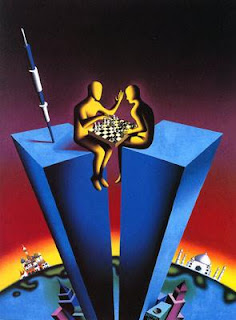FACEBOOK: SOCIAL REVOLUTION O SOCIAL ISOLATION?
Tuesday, May 25, 2010
Laser Gun Sound Pew Pew

Write a contribution for the alleged harm, or usefulness of social networks in the role of Clinical Psychologist is not simple, at least not if you want to avoid falling into the usual clichés corny, that raise the specter of loneliness and alienation Social-emotional at every new screen shot of clicks, we chat message.
So here I am talking about this new reality (even more so new now) for us all, if only in the role of judges or spectators: Let's talk 'as a psychologist, a bit' as a user, a bit 'by curious observer.
The phenomenon of social networks is one of those who, because of the immense potenziale e potere agiti sulla massa di utenti, non può vederci – soltanto pigri osservatori - in un atteggiamento di neutrale imparzialità. Se non altro perché in qualche modo ci coinvolge, nostro malgrado: “ci sei su facebook?” “no, non ancora almeno…” “ah… e perché non ci sei?”
… eh già… perché non ci sei?
Quindi ci pensi. Quindi ti devi fare un’idea, almeno per decidere se esserci o no. Quindi devi decidere. Anche solo di osservare, rimandando la fatidica scelta a tempi di maggior chiarezza intellettual-filosofico-sociologica. Semmai arriverà.
E quando arriva non dura a lungo. Perché conosco molte, molte persone who were able to stoically and energetically - citing reasons consistent and firm - to keep the point of non-participation in the frenzy of global sharing to the end and then ... and then gave up, "but we are all ..." or "ok, basically because is not it? "or even" I felt like I too find the type with which I was engaged to 8 years, he had beautiful eyes "... and so on.
The explanations are very different, subjective, fantastic but if we have a common denominator: the curiosity, wrapped the need to share.
And, if I may, to the voyeuristic curiosity and renewed desire to condivisione del popolo di FB ne fanno un branco di animali estremamente sociali e non certo un pallido e solitario stuolo di esseri crepuscolari dagli occhi cerchiati in cerca di avventure inquietanti! Ok ok… ci saranno anche gli alienati, i feticisti dell’immagine e dell’aforisma, i cercatori di avventure, i coltivatori di amicizie virtuali, i sociopatici i maniaci e gli eterni mascherati tra di loro; (ma ditemi, nel mondo esterno non ci sono?) e io comunque, ci vedo ancora desiderio di socialità, di appartenenza e di condivisione.
Eh si perché la gente di FB condivide, e condivide tutto: stati d’animo, amicizie, foto di momenti importanti o meno, dei propri amatissimi animali domestici, condivide le proprie passioni e i propri interessi. Anche i più inusuali. Perché su FB c’è posto per tutto, e c’è posto per tutti.
Io lo trovo consolatorio, liberale, unificante.
E allora ben venga la chat notturna di quando non riesci a prendere sonno; benedetta la nuova amicizia che ti incuriosisce e ti ispira simpatia; benvenuti tutti gli antichi fidanzati, i compagni della scuola elementare, le vecchie amiche perse di vista, i colleghi spariti in un’altra città, i parenti lontani, quel bel tipo che ti piace col bicipite gonfio e chi più ne ha più ne metta.
Voglio essere provocatoria: io questa la chiamo ricchezza di stimoli e di possibilità.
La chiamo condivisione a basso rischio, socialità at little cost.
nothing to do with socialization in the physical world and the consequent relationship vis-a-vis the smell, gestures, facial expressions are the masters and where we are at stake in a complete, bold. No, here is a new form of socialization to which we took our old needs (sharing, curiosity, socialization, belonging and recognition) combined with new technological possibilities. How to say the same purpose served by a different medium. And since the world began the purposes of a human being have not changed that much ...
is now to learn the different rules, know the different limits, measure our expectations based on an interactional mode is intact and not a substitute.
Aric Sigman is a psychologist who for years studied the effects of life related to social networks created in particularly vulnerable people, in a study published in Biologist seems not to have contacts in real life every day - preferring the virtual contacts - can cause damage to our body. First, altering the way the genes work, then interfering with the immune system, blood levels of hormones, the functionality of the arteries and ultimately influencing our intellectual performance. Patients with dependence on the Web (and then we talk of people not only prepared but with a disease) tend to suffer particularly induced isolation from the continuing use of social networks, because they end up preferring the friendships and contacts in virtual reality, thereby isolating themselves from the world of hands, skin, smells, looks and voice that continues to exist beyond beyond the keyboard.
As you can see the damage mentioned by users suffering from dependency on the web, which has nothing to do with the use of sense of virtual communication tools. There will be a stroke if Chat with an hour that we like, do not suddenly start to suffer devastating headaches if we publish our photos on FB, and our blood levels of hormones do not alter if we're going to snoop on boards of others ...!
Provided that it is done for most of the time! The web
dependence is a disease, and as a professional I do not feel to generalize the results to other users about this category.
remains deeply convinced, now, that social networks efficiently play their role in the social gathering, sharing tools and participation to the extent that they shall be considered just an integration and not a replacement for our special international arrangements, which are and will remain increasingly critical to the balance of our psyche and our health.
Subscribe to:
Post Comments (Atom)
0 comments:
Post a Comment